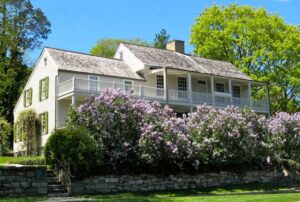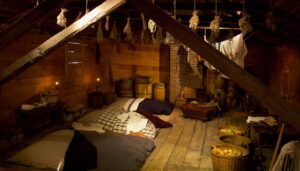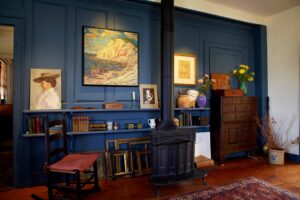Greenwich Historical Society receives grant for Bush-Holley House upgradesÂ

Greenwich Historical Society has been awarded a”¯Good to Great 2.0 Grant”¯of $418,057 that will fund critical environmental upgrades for its”¯National Historic Landmark Bush-Holley House.”¯Co-administered by the Connecticut Department of Economic and Community Development (DECD) and CT Humanities, the”¯Good to Great Grant Program funds capital projects that enable nonprofit arts, cultural and historical organizations to enhance visitors”™ experiences in meaningful ways.
“The Good to Great Grant Program is a competitive award program that recognizes those organizations that devote time and energy to planning strategies to improve the visitor experience,””¯said Liz Shapiro, director of arts, preservation and museums at DECD. “These funds have been awarded to organizations of all sizes who demonstrate deep thinking about who they are as organizations and what they could be if granted access to capital funding.”

“We are extremely grateful for the generous support of DECD,” said historical society Executive Director and CEO Debra Mecky. “Bush-Holley House is central to our mission of preserving and interpreting Greenwich history to strengthen the community”™s connection to our past, to each other and to our future. The grant will be transformative for ensuring it remains a vital aspect of our visitor experience in the decades to come, as well as an essential and relevant window into Greenwich history and a cornerstone of local historical education for thousands of Greenwich students.”
The Greenwich Historical Society will use Good to Great Grant funds to support a comprehensive series of upgrades to the Bush-Holley House”™s climate control systems, ensuring the continued stewardship of its historic furnishings and original artworks and bringing the visitor experience to a modern standard of comfort and sophistication. Upgrades will include the installation of a new central HVAC system, a high-efficiency furnace, refreshed electrical systems and more effective insulation. The artworks, which include original paintings, prints and drawings by American Impressionist artists such as Childe Hassam and Elmer Livingston MacRae, are central to connecting visitors to the Bush-Holley House”™s role as the late-19th century gathering place of Connecticut”™s first art colony and providing an engaging experience for visitors.

In addition, these environmental upgrades will make it possible in the future for the historical society to reverse a series of 1960s-era renovations made to the Bush-Holley House during the installation of its existing furnace. These included the removal of a rear service staircase, dating from the late-18th”¯or early-19th”¯century, which was taken out to make way for a modern brick exhaust chimney. This staircase originally connected the first-floor kitchen to an attic space believed to have been used as sleeping and living quarters for enslaved people who labored in the Bush family household. A separate, concealed staircase for enslaved laborers or hired service staff would have been a significant feature of a wealthy household of the era, allowing the Bush family to live and entertain guests in the house”™s public rooms while cooking, food preparation and other domestic tasks took place behind closed doors. Once the current exhaust chimney is removed, the way is paved to reinstate this service staircase in the Bush-Holley House to interpret the living and working conditions of the 15 enslaved people who were owned by the Bush family between 1790 and 1825.

”¯“A future restoration and reinterpretation of the Bush-Holley House”™s service staircase and kitchen will be a critical step in the Greenwich Historical Society”™s continued efforts to telling a fuller history that encompasses the lives of all those who lived and labored in this nationally significant house,” Mecky added. “As a result of the preservation and environmental upgrades afforded by this grant, our community will have a stronger sense of place, gain a fuller appreciation of our shared past and be better equipped to embrace opportunities for a more informed and just society.”